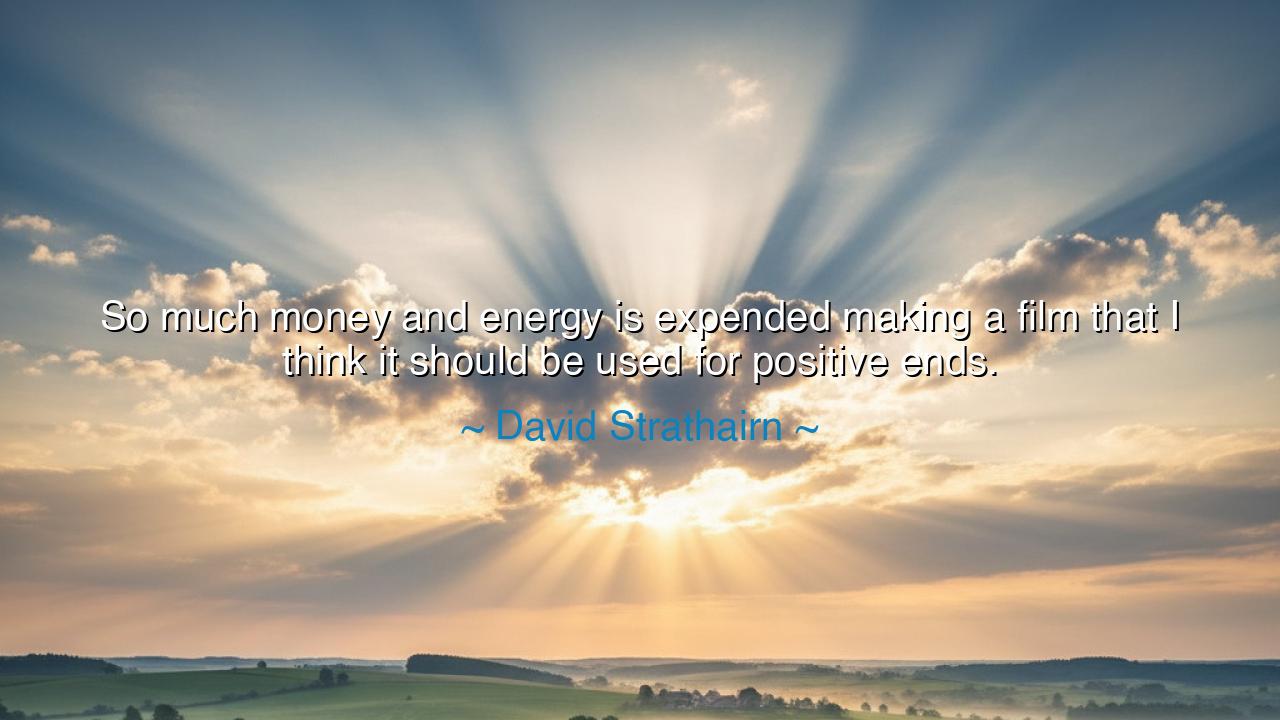
So much money and energy is expended making a film that I think
So much money and energy is expended making a film that I think it should be used for positive ends.






The words of David Strathairn, “So much money and energy is expended making a film that I think it should be used for positive ends,” are a call to responsibility wrapped in the voice of an artist. In them lies the recognition that art is not a trifling pursuit, but one that consumes vast resources—human labor, creative fire, and the wealth of nations. To pour such riches into a work is to wield a power that should not be squandered on vanity or destruction. Instead, it ought to be directed toward positive ends, uplifting the spirit, stirring thought, and shaping the world for the better.
In the ancient spirit, this echoes the wisdom of the dramatists of Greece, who saw theater not merely as entertainment, but as a mirror to the soul and the city. Sophocles and Aeschylus used the stage to teach virtue, warn of hubris, and bind their people together in shared reflection. Their tragedies were born of immense energy, rehearsed and performed with the full commitment of the polis. The aim was always higher than laughter alone—it was to leave the people wiser than they had come. Strathairn speaks in this same tradition.
History gives us the example of Charlie Chaplin’s The Great Dictator. In an age of rising tyranny, Chaplin risked reputation and fortune to wield film as a weapon for truth. He poured money and energy into a satire that exposed the madness of fascism, while ending with a plea for peace and humanity. His work embodied Strathairn’s vision: that the labor of cinema, when harnessed for noble purpose, can awaken the conscience of the world.
Yet Strathairn’s words are also a warning. Too often, vast sums are consumed to create spectacles empty of meaning, stories that glorify violence, or distractions that numb rather than awaken. When film, with all its cost and effort, is reduced to such triviality, then the true waste is not the money, but the lost chance to inspire, teach, or heal. Every great work of art is an opportunity to plant seeds in the hearts of those who watch; to misuse it is to squander the harvest.
So let this teaching endure: art is not neutral. Every song, every play, every film either uplifts or diminishes, either clarifies or confuses. The greater the energy and money spent, the greater the duty to aim high. Strathairn’s words remind us that the storyteller is also a steward, and that the greatest legacy of art is not the applause it gathers in the moment, but the positive ends it brings forth for generations to come.






TNT09KT0225 Tran Thanh Ngan
David Strathairn's statement makes me wonder how films are valued. Are they just a source of escapism and entertainment, or can they shape our values and actions? Can filmmakers and studios make meaningful contributions to societal well-being without sacrificing the creative aspect of film? How can the industry move towards more socially conscious filmmaking without losing its artistic edge?
QTNguyen Quynh Trang
It's hard to ignore how much influence films have on public perception. But when a filmmaker is working with such a big budget, are they truly in a position to use that power for good, or are they bound by industry norms and audience demand? How do we redefine what constitutes a 'positive end' in the context of storytelling and entertainment?
MDDao My Duyen
This quote brings up an important issue in the film industry—responsibility. But how far does that responsibility go? Should all movies, no matter the genre or purpose, aim for positive outcomes? Or is it possible that certain genres, like horror or dark comedies, could still offer value without necessarily aligning with 'positive ends'?
TAPham Thao Anh
It’s admirable to think that the massive resources poured into filmmaking could be directed toward making a real difference. But how realistic is it for films to always serve positive causes? Sometimes, entertainment is just that—entertainment. How can filmmakers balance the need for creativity and profit with the desire to inspire or uplift society?
TTTran Toan
While I agree with David Strathairn's perspective, I wonder if the industry is already doing enough. Do films that touch on social issues, like climate change or human rights, truly lead to positive change, or are they more of a temporary emotional experience for the audience? Should filmmakers be responsible for the long-term impact their work has on society?